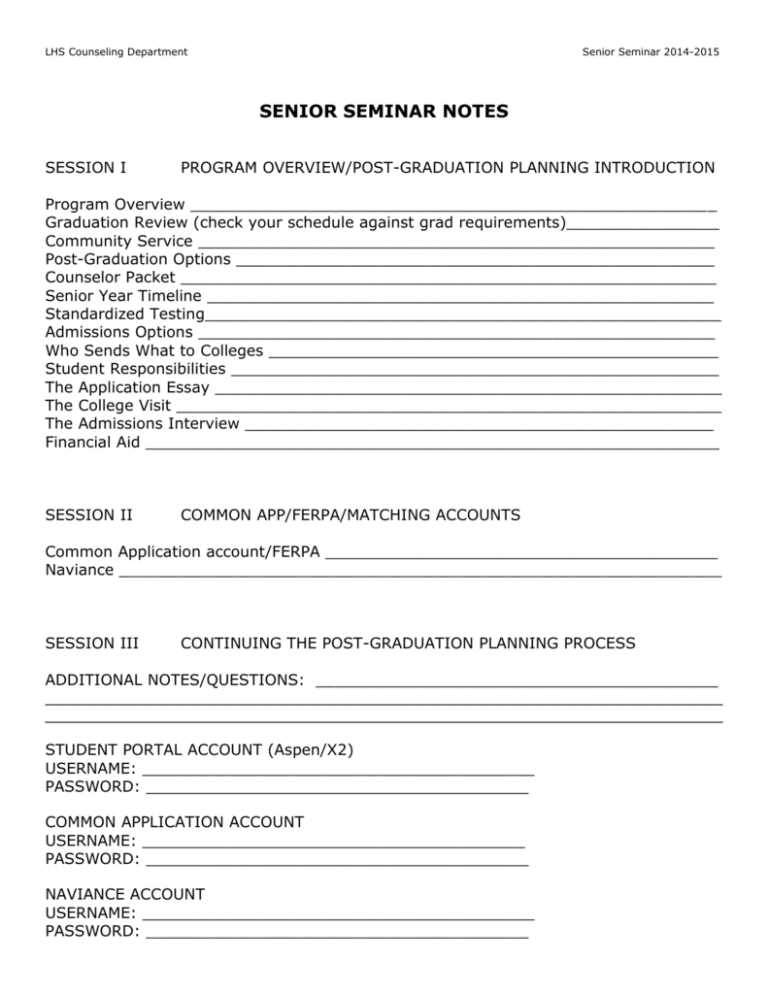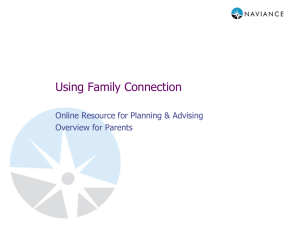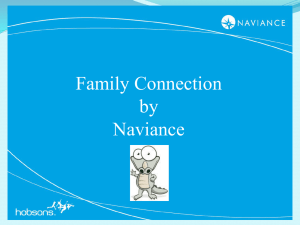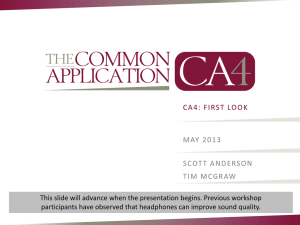
LHS Counseling Department
Senior Seminar 2014-2015
SENIOR SEMINAR NOTES
SESSION I
PROGRAM OVERVIEW/POST-GRADUATION PLANNING INTRODUCTION
Program Overview _______________________________________________________
Graduation Review (check your schedule against grad requirements)________________
Community Service ______________________________________________________
Post-Graduation Options __________________________________________________
Counselor Packet ________________________________________________________
Senior Year Timeline _____________________________________________________
Standardized Testing______________________________________________________
Admissions Options ______________________________________________________
Who Sends What to Colleges _______________________________________________
Student Responsibilities ___________________________________________________
The Application Essay _____________________________________________________
The College Visit _________________________________________________________
The Admissions Interview _________________________________________________
Financial Aid ____________________________________________________________
SESSION II
COMMON APP/FERPA/MATCHING ACCOUNTS
Common Application account/FERPA _________________________________________
Naviance _______________________________________________________________
SESSION III
CONTINUING THE POST-GRADUATION PLANNING PROCESS
ADDITIONAL NOTES/QUESTIONS: __________________________________________
__________________________________________________________________________________________
__________________________________________________________________________________________
STUDENT PORTAL ACCOUNT (Aspen/X2)
USERNAME: _________________________________________
PASSWORD: ________________________________________
COMMON APPLICATION ACCOUNT
USERNAME: ________________________________________
PASSWORD: ________________________________________
NAVIANCE ACCOUNT
USERNAME: _________________________________________
PASSWORD: ________________________________________
LHS Counseling Department
Senior Seminar 2014-2015
LEXINGTON HIGH SCHOOL
COUNSELING DEPARTMENT
SENIOR SEMINAR
PLANNING FOR GRADUATION AND BEYOND: A STEP-BY-STEP PROCESS
Last spring most of you participated in the junior guidance seminar program to enable you to
systematically approach your post-graduation planning. This fall's program will continue to
provide you with the information and skills necessary to make appropriate decisions based on
your own goals, expectations and needs.
Outlined below are the overall topics that will be discussed at each session. However, if you
have any concerns or questions that you feel need clarification, please let your counselor know.
Once these group sessions wrap up, you should make appointments with your counselor to
further discuss and address your individual post-graduation planning issues. Our expectation is
that all students will attend all sessions listed.
3 MANDATORY SESSIONS:
SESSION I
PROGRAM OVERVIEW/POST-GRADUATION PLANNING INTRODUCTION
SESSION II
COMMON APP/FERPA/MATCHING ACCOUNTS
SESSION III
CONTINUING THE POST-GRADUATION PLANNING PROCESS
* * * * * * * * * * * * DATES TO REMEMBER * * * * * * * * * * * *
Senior Parent/Guardian Workshops: locations and times TBD
Tuesday, September 23, 2014
Financial Aid Night: date, location, and times TBD
Usually early November
LHS Counseling Department
Senior Seminar 2014-2015
SENIOR YEAR TIMELINE
Fall
ATTEND ALL SENIOR SEMINAR SESSIONS.
Continue to achieve the best grades possible.
Attend a local college fair.
Register for the SAT and/or SAT Subject Test(s), and /or ACT if needed.
Notify the College Board/ACT to send your standardized test scores to the schools you’re applying
to via www.collegeboard.org or www.ACTstudent.org.
Visit colleges that you plan on applying to. Arrange to stay overnight on campus and attend
classes if possible.
Contact college athletic coaches and activity leaders who may be interested in your talents/skills.
Prepare your essays with care. Ask a qualified adult to read them over, checking for content,
structure, and spelling.
If you have spoken with teachers last year about writing you a letter of recommendation, check
with them to see if they’ve started writing yet. If you need teacher recommendations and haven’t
already secured them, ask teachers now.
Complete the Counselor Packet (Questionnaire, “Parent/Guardian Brag Sheet,” and Activity
Resume) and return to your counselor by the posted deadlines.
The financial aid process differs from college to college, you should check with each of your
colleges to understand their requirements.
Parents/guardians should attend Senior Parent Workshop and LHS Financial Aid Night.
Financial Aid forms are available online. The CSS Profile - http://student.collegeboard.org/cssfinancial-aid-profile and the Free Application for Federal Student Aid (FAFSA) http://www.fafsa.ed.gov/. The CSS Profile is available in September and the FAFSA is usually
available by late November. (Students needing financial aid, who are applying early decision to
colleges that require the CSS Profile, must register in the fall.)
Winter
Complete the required financial aid forms, adhering to the colleges’ financial aid deadlines.
Investigate scholarship opportunities at the colleges of your choice and file any additional required
forms.
File local scholarship applications by the deadlines listed in the winter scholarship packet that goes
out to all seniors through Naviance.
Register for AP exams, if appropriate. Information is posted on the school/counseling department
websites, through the PTSA listserve, and via HR announcements.
Spring
Confirm your intent to enroll at the college of your choice by sending in your deposit by May 1.
Notify the colleges you will not be attending once you have made your decision. This notification
allows colleges to admit students from their Wait Lists.
If you are on a Wait List, inform the college whether or not you would like to remain on the Wait
List.
Inform your counselor about your college responses.
Write thank you notes to everyone who wrote letters of recommendation for you and helped you in
this process, and inform them of your college choice.
Complete the Counseling Department’s Senior Survey so the registrar can send your final transcript
to your college.
Maintain the highest level of academic achievement, as colleges require a copy of your
final grades. Penalties may occur (including rescinding acceptance), if your final
transcript reveals a downturn in performance.
LHS Counseling Department
Senior Seminar 2014-2015
How to write a college application essay
By Margaret Metzger
Brookline High School, Massachusetts
Many colleges require a short essay as part of the application process. The directions for the essay vary from college
to college. Most colleges offer some variation of the topic, “Tell us more about yourself.”
Like most students, you might hate this subject and dread writing the essay. You know that it is a crucial piece of
writing and that it must be done, but secretly you hope somehow to avoid the task. Like most tasks, the tension
created by procrastinating is worse than the work itself – in this case, just sitting down and writing the essay.
You can use the college essay to strengthen your application. In fact, your essay can be the strongest part,
presenting you as a thoughtful, sincere, interesting applicant. You can use the college essay to explain mistakes of
the past – failed courses, low SAT scores, or few extracurricular activities. Best of all, you can demonstrate that you
know how to write well, an ability all colleges value.
Find a topic
Colleges genuinely want to know who you are. Although it is difficult to believe, they do not have an “ideal student”
in mind. They want a variety of students. They understand that they can’t know everything about you by your grade
point average and your SAT scores. They want to know what kind of person you are, what aspirations you have, what
struggles you have gone through, what is important to you. They ask you to write an essay about yourself because
they want more personal information.
Before you write, think about how you may be different from other applicants. What unusual experience would you
bring to the college? What interests, activities, travel, struggles, or situations have had a particular impact on you?
You are probably thinking, “Nothing is special about me; I’m just an average kid.” That’s what most students think.
Sometimes it helps to ask other people what they think is unique about you.
If you know exactly what you want to write about, you are lucky. Use that topic. Be sure to consider the traditional,
but appropriate and effective topics, such as academic achievements, extracurricular activities, travel and work
experiences, and life-changing events.
Also think of more subtle accomplishments. What kind of student are you? In which class did you learn to think, to
study? What do you do with your free time? What have you done for the past two summers? What words would you
use to describe your personality? Do you belong to any organizations outside high school? What jobs have you held?
What have you learned about organizing your time? Who is your most unusual friend? What magazines, newspapers,
columnists, or authors do you like to read? What are some of the failures or disappointments in your life? What kind
of plans do you have for the future? Who has been influential in your life? What responsibilities do you have at
home? What do you do for other people? What does music (particularly playing or composing) mean to you? How
have you changed (besides physically) in the last four years?
Be specific
Remember that the admissions board is reading hundreds of applications, and you must make yours memorable.
Some students resort to gimmicks: 8-inch-by-10-inch glossy pictures of themselves hang gliding, or a videotape of a
cartoon book about themselves. You may have heard stories of about an ordinary student getting into an exclusive
college by taking a creative or startling approach. But gimmicks are high risk. Maybe the admissions board doesn’t
have the time or equipment to play the videotape of your band. Maybe you will seem egocentric or cute or, more
likely, as though you are dodging the difficult task that everyone else has done: writing an essay.
You can make yourself stand out from the crowd and stress your individuality by a less risky method. Your English
teachers have been telling you for years to use specifics when you write. Specifics make a piece of writing
memorable. This basic principle of good writing applies, as well, to writing the college essay. Be specific. Tell the
truth about yourself as specifically as possible. If you claim that you like school, say exactly what you like. “I like
biology and got particularly interested in a three-month project I did about algae on the teeth.” Always be as specific
as possible.
Narrow your topic
You have only one-and-a-half to two pages for this essay. You can’t write about everything that has ever happened
to you. You need one to three topics for this paper. You must pick a few of the most important aspects of your
identity.
LHS Counseling Department
Senior Seminar 2014-2015
If you cover too much, you will be forced to be superficial. Don’t say, “I like school. I am a leader. I play basketball.
I’ve traveled to Sri Lanka, Alaska, Iowa, and South Africa. I play the violin. I work every weekend. I believe in
responsibility. I want to be famous.” Pick one, two, or at the most, three important things about yourself and
concentrate on them.
Show, don’t tell
You need to know and apply the writing principle of “show, don’t tell”: Give the readers such convincing evidence that
they draw the conclusion you want them to draw. If you provide all the evidence of your fine qualities, you don’t have
to list them. Besides, the college will be much more likely to consider you sincere if you give examples rather than a
list of glorious adjectives about yourself.
For instance, you might be embarrassed to say, “I am extremely responsible.” Instead you could say, “Last summer,
I was put in charge of 12 ten-year-old girls for a three-day hike.” When the college admissions board members read
your example, they will come to the conclusion, “Ah, some adult must have felt this applicant could be responsible for
a dozen children’s health and safety for several days. This sounds like a responsible person.” Give your readers the
evidence and examples, and they will reach the right conclusion.
Describe what you have done
You don’t need a long list of flashy experiences. What you have experienced is not as important as what you have
done with the experience. Real maturity depends on how you understand what has happened to you and whether you
let your experiences change your perceptions.
Colleges want to know how you have reacted to your experiences. For example, many students have failed some test
or course. Colleges would like to know what you did with that failure. Did you mope? Blame the teacher? Quit doing
homework because you were angry at the failure? Did you see the failure as a warning, an impetus, a challenge?
Even if you did write about something exotic, you must say what you did and what you learned. One student went to
Israel for two weeks; her only observation was that the Israeli women wore longer skirts than the Americans. Her
trivial description revealed her immaturity and poor powers of observation.
When you are explaining what you learned, do not say “I learned a lot.” Be specific. Tell exactly what you learned.
You want to show colleges that you will change and grow through a college education.
Focus on yourself
If you feel self-conscious writing the essay, you may be tempted to dodge the task of writing about yourself and write,
instead, about something related to you, such as a group or an organization you belong to. Avoid this approach.
Work on the first sentence
There are two opposing approaches to making a strong opening sentence. The first suggestion is that you spend
hours on the first sentence because it sets the tone and direction of the essay. The reasoning is that you need to
know where you are going before you begin. The problem with this approach is that students become paralyzed
trying to find the perfect beginning.
The second suggestion is that you begin anywhere and write the first sentence last. The reasoning is that you need to
get started, and you don’t know what you will end up saying until you have finished the essay. You may discover that
your essay really begins in the middle of the second or third paragraph, and you can cut out all the preliminaries.
Then you can start with a sturdy statement. The problem with this approach is that you might begin an essay without
a sense of direction and wander too much.
You may go back and forth between trying to write a perfect beginning and just trying to get started. No matter what
you do, when you finish the essay, go back to the beginning and work on the first sentences. Cut out all wordiness.
Make it specific. Check the grammar.
Final bit of advice
Millions of students before you have written college essays. They hated the task too. But it must get done. Of
course, it is better to write it long before the deadline. The real problem for most students is how to get started, what
topic to use, and how to avoid procrastination.
The solution is simply to begin.
College Counseling Sourcebook, 5th edition. ©2008 The College Board.
All rights reserved. Permission granted to copy this for educational purposes.
LHS Counseling Department
Senior Seminar 2014-2015
Twelve Myths About Paying For College
Billions of dollars in financial aid are available to those who need help paying for college. Yet a lot of
misinformation clouds the facts about what type of aid is available and who is eligible. Here are some myths
dispelled for those confronting the process of securing financial aid.
College is just too expensive for our family
.
Despite the media hype, a college education is more affordable than most people think, especially when
you consider that college graduates earn an average of $1 million more over the span of their careers
than high school graduates. The average yearly tuition at a four-year public college in 2006-2007 was
just $5,836. There are some expensive schools, but high tuition is not a requirement for a good
education.
There’s not a lot of financial aid available
.
In fact, more than $130 billion in student financial aid is available. Most students receive some form of
aid. Less of this aid now comes in the form of grants, however; most aid is awarded through lowinterest loans or institutional and other grants. You should carefully consider the financing packages
you’ve been offered by each college to determine which makes the most financial sense.
My family’s income is too high to qualify for aid
.
Aid is intended to make a college education available for students of families in many financial
situations. College financial aid administrators often take into account not only income but also other
family members in college, home mortgage costs, and other factors. Aid is awarded to many families
with incomes they thought would disqualify them.
My parents saved for college, so we won’t qualify for aid
.
Saving for college is always a good idea. Since most financial aid comes in the form of loans, the aid
you are likely to receive will need to be repaid. Tucking away money could mean that you have fewer
loans to repay, and it won’t make you ineligible for aid if you need it. A family’s share of college costs is
based mostly on income not assets such as savings.
I’m not a straight-A student, so I won’t get aid
.
It’s true that many scholarships reward merit, but most federal aid is based on financial need and does
not even consider grades.
If I apply for a loan, I have to take it
.
Families are not obligated to accept a low-interest loan if it is awarded to them. One financial aid
administrator recommends applying for aid and comparing the loan awards with other debt instruments
and assets to determine the best financial deal.
Working will hurt my academic success
.
Students who attempt to juggle full-time work and full-time studies do struggle. But research shows
that students who work a moderate amount often do better academically. Securing an on-campus job
related to career goals is a good way for you to help pay college costs, get experience, and create ties
with the university.
Millions of dollars in scholarships go unused every year.
.
Professional scholarship search services often tout this statistic. In fact, most unclaimed money is slated
for a few eligible candidates, such as employees of a specific corporation or members of a certain
organization. Most financial aid comes from the federal government, although it is a good idea to
research nonfederal sources of aid.
LHS Counseling Department
Senior Seminar 2013-2014
My folks will have to sell their house to pay for college
.
Home value is not considered in calculations for federal aid. Colleges may take home equity into
account when determining how much you are expected to contribute to college cost, but income is a far
greater factor in this determination. No college will expect your parents to sell their house to pay for
your education.
I should live at home to cut costs.
.
It’s wise to study every avenue for reducing college costs but living at home may not be the best way.
Be sure to consider commuting and parking costs when you do this calculation. Living on campus may
create more opportunities for work and other benefits.
Private schools are out of reach for my family
.
Experts recommend deferring cost considerations until late in the college selection process. Your most
important consideration is to find a school that meets your academic, career, and personal needs. In
fact, you might have a better chance of receiving aid from a private school. Private colleges often
offer more financial aid to attract students form every income level. Higher college expenses also
mean a better chance of demonstrating financial need.
We can negotiate a better deal
.
Many colleges will be sensitive to a family’s specific financial situation, especially if certain
nondiscretionary costs, such as unusually high medical bills, have been overlooked. But most colleges
adhere to specific financial aid award guidelines and will not adjust an award for a family that feels it
got a better deal at another school.
Source: www.collegeboard.org
College Counseling Sourcebook, 5th edition. ©2008 The College Board.
All rights reserved. Permission granted to copy this for educational purposes.
Financial Aid Websites
CSS Profile - http://student.collegeboard.org/css-financial-aid-profile
FAFSA - http://www.fafsa.ed.gov/
MEFA (Mass. Educational Financing Authority) - http://www.mefa.org
SmartStudent Guide to Financial Aid - http://www.finaid.org/
FastWeb - http://www.fastweb.com
In Like Me - http://inlikeme.com/financial-aid/
http://inlikeme.com/scholarships/
LHS Counseling Department
Senior Seminar 2014-2015
NAVIANCE CHECKLIST
Naviance is a multipurpose tool that allows us to assist you in your career and college
planning. More importantly, this year, it is used to process all of your transcript
requests – for colleges, programs, the NCAA, and scholarships. It is imperative that you
understand how Naviance works, and follow all steps accurately and in a timely fashion.
Some of this process began during Junior Seminars and last spring. Find out where you
are on the checklist, and continue through the process in Senior Seminar and
throughout the rest of the year.
College Planning
_____ Register with Naviance:
http://connection.naviance.com/lexington
You should have registered during junior seminar (if you can’t remember your
password, click the link on the website for assistance). If you have not registered,
see your counselor.
_____ You should continually enter and update your potential schools under
“Colleges I’m Thinking About” in your Naviance account (throughout spring of
junior year, summer and into senior year).
Applying to Schools/Requesting Transcripts
_____ Make sure that your parents have submitted a Records Release Form (sent electronically from the Registrar’s office last year). If you are unsure whether this has
been taken care of, please consult the list posted outside of Rm. 150. The paper
copy is available here: http://lps.lexingtonma.org/Page/1384
_____ Open up a Common App account, complete the FERPA, and match your Common
App and Naviance accounts. You may have already completed some of these
steps, but be sure that you have completed them all or we will be unable to send
out your documents.
Log into Naviance at: https://connection.naviance.com/Lexington
Click on the gray Colleges top tab
Click on “Colleges I’m Applying To” link
Follow the links to the Common App
Create a Common App account
You must then complete the Education portion of the Common App (to save
time, answer only the mandatory questions, enter “0” wherever possible,
and skip any optional questions – you can always come back and
update/correct)
Once you have completed the Education portion, add a school to your list by
clicking on College Search
Once you have a college added to your list, click on My Colleges, pick a
school, click on Assign Recommenders, and complete the FERPA
Return to your Naviance account
Enter your Common App account email address and click the Match button
LHS Counseling Department
Senior Seminar 2013-2014
_____ Move your “Colleges I’m Thinking About” to “Colleges I’m Applying To” by
clicking on the boxes to the left of each school and clicking the gray “Move to
Application List” box at the bottom of your list. Or, you can click on the “Colleges
I’m Applying To” link at the left of your page, and add your schools there.
_____ To request transcripts to be sent, click on the Colleges top tab and the
Transcripts side tab. Click on the “Request Transcripts for College Applications”
link. Click the boxes next to the colleges you are requesting transcripts for. Scroll
down and click the “Request Transcripts” button. The registrar will then send an
official copy of your transcript, the LHS School Profile, and your Counselor
Statement to the colleges you’ve requested transcripts for. Payment will be made
at the end of the school year via your MCC eSchool account.
TRANSCRIPT REQUEST/COUNSELOR PACKET DEADLINES 2014-2015
TO ENSURE THAT YOUR TRANSCRIPT, THE LHS PROFILE AND YOUR
COUNSELOR STATEMENT REACH THE ADMISSIONS OFFICE BY THE COLLEGE’S
APPLICATION DEADLINE, YOU MUST FOLOW THE ABOVE STEPS AND GIVE
YOUR COUNSELOR PACKET TO YOUR COUNSELOR BY THE FOLLOWING DATES:
COLLEGE APPLICATION DEADLINE
LHS REQUEST DEADLINE
October 15th
September 26th
November 1st
October 3rd
November 15th
October 17th
December 1st
November 3rd
December 15th
November 17th
January 1st
December 3rd
January 15th
December 18th
February 1st
January 5th
February 15th
January 16th
March 1st
February 6th
Rolling Admissions
3 weeks prior to date requested




